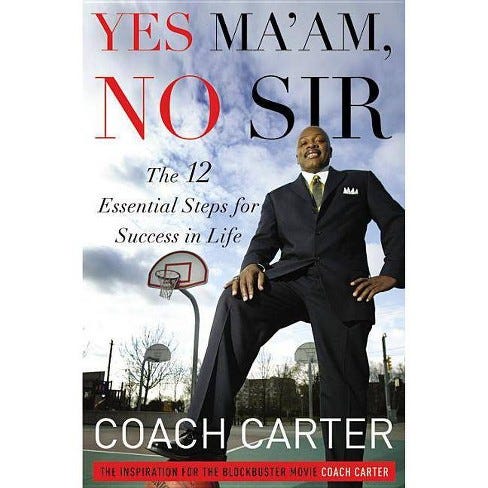In December, I will be taking up a new coaching certification. This will take my game to the next level in rather drastic ways. And I know it will, because that’s where my own coach was trained. As part of the prep work for the certification, it was suggested I watch the 2005 movie Coach Carter, with Samuel L Jackson in the titular role, based on a true story.
The movie relates to the unbelievably life-changing potential of proper coaching. Now, I have coached hundreds of people, I know it changes lives, but the story of the Richmond basketball team is a standard I am not afraid to admit I don't have in my proverbial trophy cabinet. It’s a whooole new level.
Obviously, that sent me down the rabbit hole when I realised that Coach Carter then wrote books. I just finished Yes Ma’am, No Sir.
There are a lot of insights. Most of them are not that new, but still a good refresher. However, there is one sentence I simply cannot get out of my mind, like an earworm, but without the music to go with it.
The shortest pencil has better recall than the longest memory.
Coach Ken Carter
Written beats memorised. Any time, every time. Always had, always will. Period.
There are many reasons to advocate for writing. A lot of my own growth in 2024 comes down to writing.
Now, I’m not going to advocate you buy half a dozen notebooks and carry one at all times with you (although I do love my completely empty but stunning notebooks), nor will I insist you should write everything by hand, even if this has been the single biggest decision-making factor in all my computer purchases of the last five years.

Writing has always felt like a bit of a cheat code, but this year, this has reached a whole new level with my enhanced and more intentional practice.
Continue reading to find out how to make it your strength too!
1. Writing slows down, clarifies, and improves thinking
Thoughts race in our heads. They go fast. They barely need to make sense, or be translated into words, they just exist, for fleeting moments, and are replaced by something else. The pace would break a speed-o-meter many times over.
In contrast, writing is frustrating. It’s slow. It’s considered. It has more rules, and requires more structure. That frustration is positive. It’s an ally.
Because you need to put things into words, it forces you to clarify your thinking, it forces you to assess and dissect what you are thinking and saying. This clarifies your thinking significantly and can help you make sense of and understand what really matters in your thinking. It’s like being your own sounding board to your ideas.
Since I adopted a decision log this year for some less straightforward or more important decisions, writing has become an actual decision-making tool for me. It’s my brain and my fingers discussing with each other what the right decision is. I never start my decision log knowing what I want to do, but I always finish knowing what the right call is. And because I have discussed it with myself at length, with a few carefully chosen prompts, I’m also far more confident that the decision is the correct one. They may have Software as a Service, but I am far more impressed by Writing as a Decision-Making-Tool (although I admit WaadMT doesn’t quite roll off the tongue).
2. Time travelling through writing
The single most important thing when you write is identifying your audience. You are always writing for someone. You are writing for a reason. You want that someone to do something. And for them to do whatever you want them to, it needs to make sense and be clear for them.
While a lot of our communication nowadays is time-bound and serves a single purpose, happily auto-destructing when consumed, some things are more timeless, and may need to be consulted at a later date. If that’s the case, don’t write for “Today you” or “Today Joe Bloggs”. Write for your future counterparts. Whomever the audience is, write for who they will be in a month, rather than today.
This change in perspective forces you to be clearer, as the current context will not apply. So instead of “This initiative is moving the needle a lot this month”, you would write “Project Delta Indigo Papa has really improved things in October 2024”. Don’t assume context, be clear. Clarity starves off one of the biggest sources of conflicts in teams: misunderstanding.
3. When one teaches, two learn
I have previously admitted in this letter that my writing was selfish. I’m not afraid to repeat it. I write because it benefits me, but I love it when it also serves other people.
Only a few months after starting my career in 2015, I started writing what you would today call “thought leadership” content. I didn’t have experience, and so, no many thoughts of my own to share. However, I had my finger on the pulse, and a lot of my early writing was about innovation around the world, and how I foresaw that changing things. I was writing partly to build a name for myself, but every time I wrote, I learned something. Something I could share in a client conversation, something I could use as an example for a project.
Writing is a very powerful way to validate how well you understand a particular topic. It often, forces you to level your game up, as the knowledge required to write is far greater than the knowledge required to (think we) understand. Writing is a massively underrated learning tool. Want to learn something? Write it.
Today, I write the Letter to force myself to think more clearly and share what I know, but it is also a great way to add value to people who may not be able to afford my 1:1 coaching (although, obviously, my coaching is several levels of magnitude more valuable than what I can convey in a newsletter).
4. Writing lasts longer, full stop
I like to think I have a decent memory. I also live a busy life, with many contexts to switch across.
Unless I write something, I must assume it will be forgotten.
Unless I write an action, I must assume I won’t execute it.
Unless I write what I am waiting from someone else, I must assume I will forget about it.
Not to be morbid, but… Even if I had a photographic memory, my writing will outlive me. It certainly will outlive my attention span and my memory, but there is nothing longer lasting than writing. I have a book from 1821 in my bookcase. The author, their children, and their grandchildren have long gone. The only reason I have access to that content is because they put quill to parchment. Most of what I write will be inconsequential, and the same goes for you, but, what if it isn’t? What if your legacy could live on, for several generations, simply because you decided to document something that would otherwise only have existed in your mind?
You don’t need to be the next Seneca for your thoughts to be valuable after you are gone.
5. Writing is special
While all I have shared above very much focuses on levelling up from a career point of view, writing is special. There is more to it.
Writing is a gift. Writing can fill people with gratitude. This week, I was at an event with a friend. While we were sat at the dinner table, he took his name card, and just wrote on it “You made this possible. Thank you again” and put it in front of me. That card is currently sat on my desk. It’s a memento I will treasure for years to come, because of what it conveys.
Likewise, how would it feel if you found a letter from one of your great-grandfathers sharing some of his stories and life lessons. How valuable would that be for you?
As coach Carter said:
The shortest pencil has better recall than the longest memory.
What you write will help your career far more than what you remember. Especially in an age where people are using ChatGPT to write to others, and the recipient uses ChatGPT to summarise what ChatGPT wrote and asks ChatGPT to answer to ChatGPT, there has never been anything more valuable than organic writing. Please, don’t outsource this art to technology. Let AI augment you, not replace you.
Get writing. Crucially, normalise writing for yourself. You are your single most important audience, treat yourself accordingly. Just Write.





